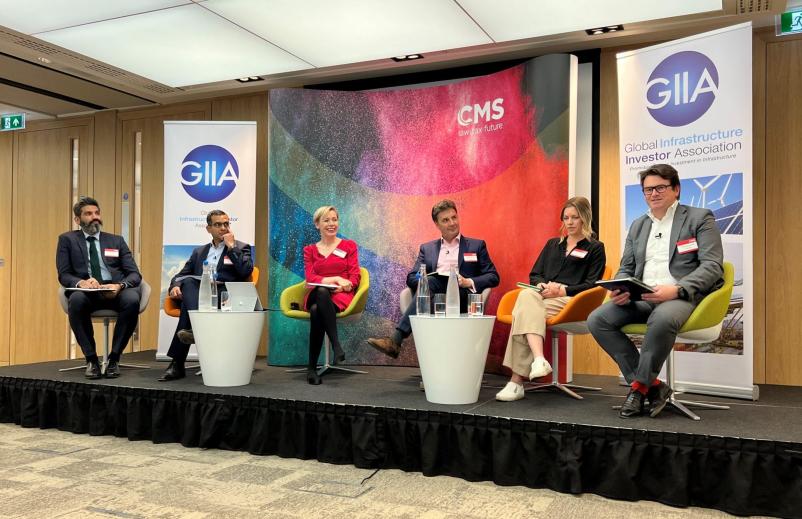Breadcrumb
Decarbonising Land Transport Event 28th April 2022

GIIA, in partnership with CMS, hosted a hybrid ‘Decarbonising Transport’ panel event - the first in a series of planned discussions around the journey to net zero for land, aviation and maritime transport. Panel experts offered incisive thoughts and perspectives on both the scale of the challenge ahead, as well as the route to delivering workable solutions, against a backdrop of the government’s ambitious and legally binding Net Zero commitments.
The session began with a retrospective look at how the development and introduction of electric vehicles (EVs) has evolved over the last decade, with transport responsible for approximately 37% of total global emissions and 10% of that being derived from roads, with the statistics illustrating an acute need for rapid and far-reaching changes to our current approach. Panelists felt that initially, strategic investors were taking the lead in this space, although the last year or so had seen exponential growth in the EV space, with one panelist remarking that in the last year alone, the UK had sold more electric vehicles than in the previous five years combined.
The conversation shifted to the need for the direction of travel to actively encourage a renewed focus towards areas that are harder to decarbonise – electric vehicles are arguably seen by many as being well on the way to enjoying mass delivery and growth within the market, while other fields, including heavy goods vehicles that transport freight and goods, tend to remain challenging and in need of a collective interest to spark innovation and identify new solutions.
A further topic of discussion centred around the infrastructure capacity necessitated by a shift towards electric vehicles – for example, both within the supply chain, as well as investment in a greater number of public charging points (with c.30,000 in operation currently and a government ambition to see approximately 300,000 in the years ahead). The notion of converting existing petrol stations, to electric vehicle charging locations was dismissed as unworkable, with a need for the existing sites to be decommissioned and then redeveloped. Additionally, the need for new electric vehicle charging forecourts to have stable connections to the grid, also rendered this possibility unworkable. From an investor perspective while there appeared to be confidence in the direction of travel, a clear question remained, in respect of the timescale and speed with which utilisation of EVs would be elevated– a clear demand side concern.
Conversation turned towards consumer behaviour and attitudes towards public transport, with a keen focus on the need to “make people’s attitudes investable”, with a panel member remarking that currently, rail represents only 1% of greenhouse gas emissions and a single train results in approximately 500 cars being taken off the road. In fact, concepts of potential hybrid solutions for decarbonising trains were vocalised, including battery technology that could be utilised at key junctures (as the train departs from/arrives at a platform), as well as through the electrification of railway.
Broadly, in respect of electric vehicles, multi-faceted challenges around consumer opinion were also expressed: the first, around the price, with EV’s remaining comparatively expensive for cash-strapped consumers in the throws of a ‘cost of living’ crisis, while power was regarded as a parallel concern around the capacity and longevity of electric vehicles to withstand long journeys without the need for numerous charging pit-stops.
The panel perceived that encouraging signals had been issued by the government – notably the blanket ban on sales of all new petrol and diesel vehicles by 2030, which many considered to represent a driving force towards providing an attractive business opportunity for the investor community, while also encouraging consumers to make the switch. More broadly, a further encouraging nod towards determination in the decarbonisation space, was in the form of a secondary DfT permanent secretary being appointed to head up decarbonisation – echoing the government’s commitment to delivering on climate objectives.
Finally, an interesting view was shared around the need not just for electrification as part of the decarbonisation process, but also a clear desire and demand from consumers (feeding into broader ESG expectations) that the electricity must be derived from clean, green, renewable sources. This compells investors to examine and implement environmental sustainability measures throughout the supply chain, including in the development of green hydrogen and offshore wind infrastructure.
The event provided the opportunity for an insightful and compelling discussion that highlighted the momentum within and across the investor community, to deliver on our climate objectives- in doing so, securing the welfare of our planet and ability to adapt to an evolving set of risks. While change so far has been welcome, the need to sustain and capitalize on existing momentum, remains. Government policy announcements certainly have the capacity to catalyse interest and identify green, investable opportunities for key players (for example within the recent Hydrogen Investor Roadmap), that provide long-term stable returns and better outcomes for the UK in its entirety.
Ensuring the UK retains its reputation as an attractive investment destination, as well as leading best practice in the development and rollout of EV infrastructure, remains a key facet of the challenge to decarbonise domestically. While this panel focused specifically on land transport, forthcoming discussions within this programme will seek to identify opportunities, challenges and a clear roadmap to change, in alternative transport areas including maritime and aviation-based travel.